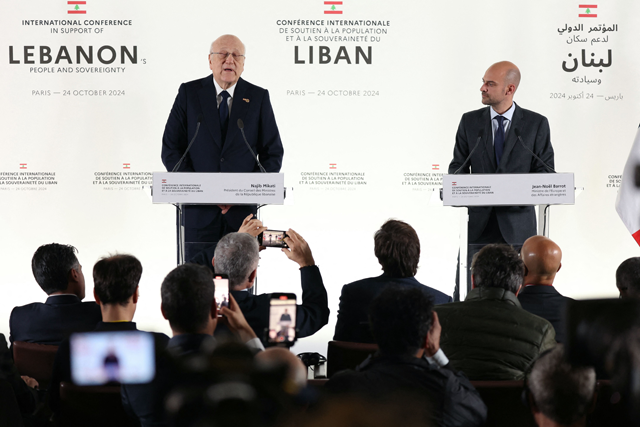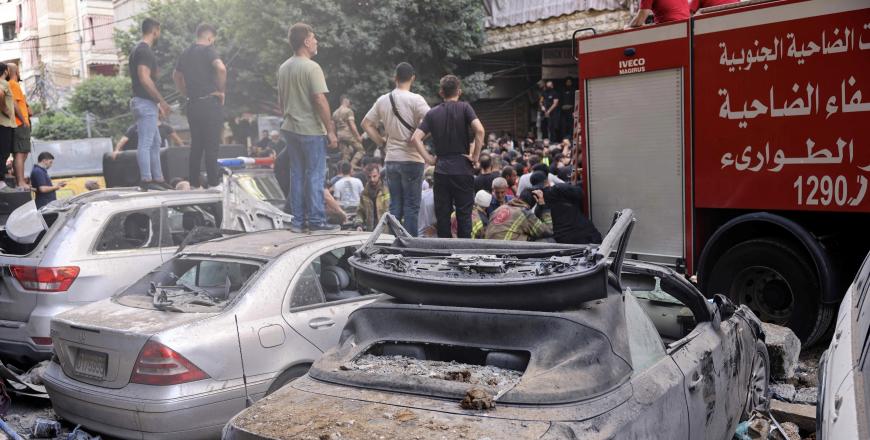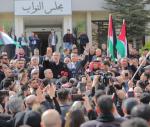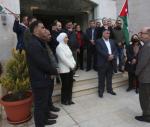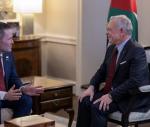You are here
Lebanon says 1,540 dead in nearly a year of cross-border fire
By AFP - Sep 26,2024 - Last updated at Sep 26,2024
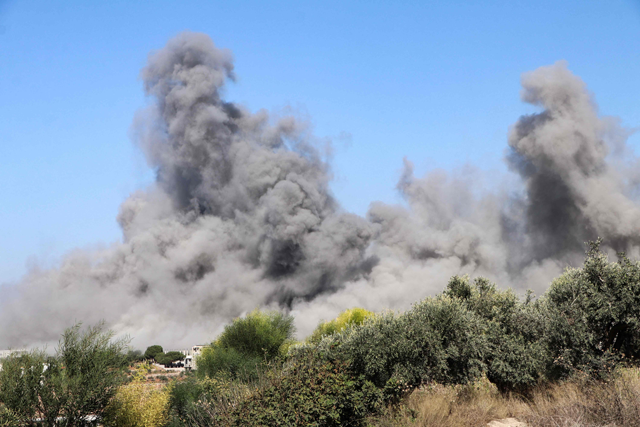
Smoke rises over the site of an Israeli airstrike that targeted the southern Lebanese village of Siddiqin on September 26, 2024 (AFP photo)
BEIRUT, Lebanon — Lebanon said Thursday that more than 1,500 people had been killed in almost a year of cross-border violence between Hezbollah and the Israeli army that has spiralled dramatically this week.
According to figures in a statement released by the country's disaster management unit, 1,540 people have been killed, 60 of them in the past 24 hours, and 5,410 wounded in the ongoing hostilities.
The US and French leaders pressed jointly Wednesday for an immediate 21-day ceasefire in Lebanon, in a call joined by allies as the death toll mounts from Israeli strikes on Hizbollah.
Presidents Joe Biden and Emmanuel Macron met on the sidelines of the UN General Assembly in New York as they voiced fears that the conflict, after a year of bloodshed in Gaza, would escalate into a full-blown regional war.
The situation in Lebanon has become "intolerable" and "is in nobody's interest, neither of the people of Israel nor of the people of Lebanon," said a joint statement released by the White House.
"We call for an immediate 21 day ceasefire across the Lebanon-Israel border to provide space for diplomacy towards the conclusion of a diplomatic settlement."
The statement was issued jointly with Western powers, Japan and key Gulf Arab powers -- Qatar, Saudi Arabia and the United Arab Emirates.
French Foreign Minister Jean-Noel Barrot earlier unveiled the proposal at an emergency Security Council session.
"There has been important progress in the past few hours," Barrot said.
"We've been working since the start of the week in New York on a diplomatic solution with our American friends in particular."
UN Secretary-General Antonio Guterres urged an immediate ceasefire in Lebanon and warned, "Hell is breaking loose."
Israel said it welcomed diplomacy on Lebanon but did not commit to a ceasefire, vowing to pursue its goal of degrading Hizbollah.
"We are grateful for all those who are making a sincere effort with diplomacy to avoid escalation, to avoid a full war," Israel's envoy to the United Nations, Danny Danon, told reporters before entering the session.
But he added: "We will use all means at our disposal, in accordance with international law, to achieve our aims."
The violence comes after the failure to reach a ceasefire in Gaza where Israel for nearly a year has been seeking to wipe out another Iranian ally, Hamas, which carried out the deadliest attack ever on Israel.
Iranian Foreign Minister Abbas Araghchi warned that Tehran, which in recent weeks has held back on retaliatory strikes on Israel after attacks targeting Iranian interests, may no longer be restrained.
"The region is on the brink of a full-scale catastrophe. If unchecked, the world will face catastrophic consequences," he told reporters.
Hizbollah holds powerful influence within long-turbulent Lebanon. The country's foreign minister, Abdallah Bou Habib, asked by reporters if a ceasefire was possible, said: "Hopefully yes."
'Acute' risk of escalation
Israel went ahead with the offensive in Lebanon despite repeated appeals by the United States to avoid a wider war.
"Risk of escalation in the region is acute," said Secretary of State Antony Blinken, who has made 10 trips to the Middle East since the Hamas attack of October 7, 2023.
Israel and Hezbollah had been skirmishing since the outbreak of the war in Gaza, but at a lower level.
Last week pagers and other handheld communications devices of Hizbollah exploded in an operation widely attributed to Israel.
Hundreds have died and thousands have been displaced since Israel launched its strikes, with the Lebanese health ministry saying that another 72 people died on Wednesday.
Diplomats said that the United States was no longer directly linking its struggling push for a Gaza ceasefire with Lebanon efforts due to the urgency of the crisis.
"An all-out war is possible," Biden said on ABC's chat show "The View."
"What I think is, also, the opportunity is still in play to have a settlement that could fundamentally change the whole region," Biden said.
Robert Wood, the deputy US ambassador to the United Nations, told the Security Council he was concerned by deaths in Lebanon.
But he also pinned blame on Hizbollah, accusing it of violating Security Council resolutions through its alliance with Hamas since October 7.
"Nobody wants to see a repeat of the full-blown war that occurred in 2006," Wood said.
But he said that any end to the conflict needed to include a "comprehensive understanding" that preserves calm along the Blue Line between Israel and Lebanon.
Related Articles
BEIRUT, Lebanon — Israel warned Monday it would use all its might to hit Hizbollah even after the killing of its leader, as the Iran-backed
PARIS — An aid conference for Lebanon opens in Paris on Thursday in the hope of raising half a billion euros ($540 billion), with hosts Fran
BEIRUT, Lebanon - Israel said Hizbollah fired dozens of rockets from Lebanon on Friday following overnight air strikes which destroyed dozen



